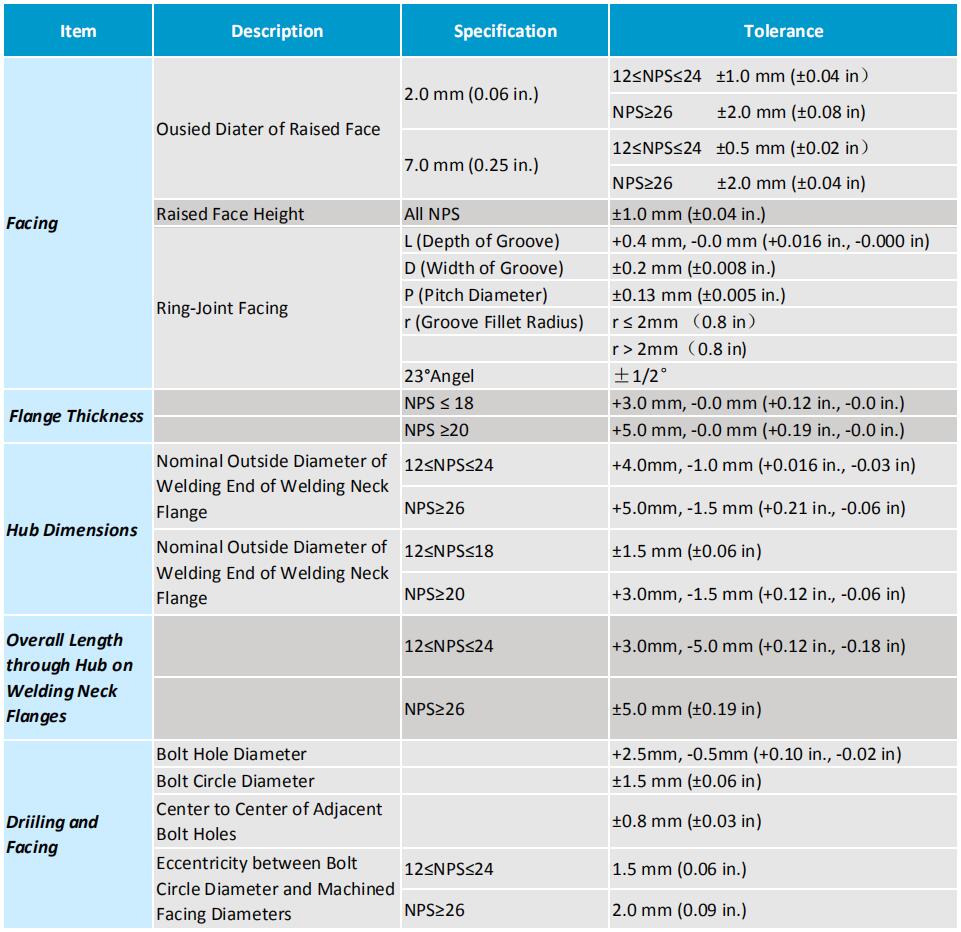Nipo Flange
Nipoflange is a connection that has a flange on one side and a Nipolet on the other side.
MSS SP-44 covers pressure-temperature ratings, materials, dimensions, tolerances, marking, and testing for steel pipeline flanges.
Download PDFMSS SP-44 is the standard for high-strength, cold-worked, carbon steel grade welding for pipelines. It provides guidelines for the design, manufacturing, and testing of flanges used in pipeline systems.
The flanges covered by MSS SP-44 range in size from NPS 12 to NPS 24, and they are equivalent to ASME B16.5 flanges. Additionally, MSS SP-44 also covers flanges larger than NPS 26, which are known as ASME B16.47 Series A flanges.
It is important to note that MSS SP-44 is the only source for NPS 22 flange dimensions.
The standard inlcudes all the flange types in forged steel or steel inlcudes Weld Neck Flange, Slip On Flange, Lap Joint Flange and Blind flanges and etc.
Dimensional and tolerance requirements for NPS 10 and smaller flanges in this standard refer to ASME B16.5.
Flanges understand the standard has follwing pressure ratings: Class 150, 300, 400, 600 or 900.
NPS and DN as follows:
| NPS | 12 | 14 | 16 | 18 | 20 | 22 | 24 | 26 | 28 | 30 | 32 | 34 | 36 |
|---|---|---|---|---|---|---|---|---|---|---|---|---|---|
| DN | 300 | 350 | 400 | 450 | 500 | 550 | 600 | 650 | 700 | 750 | 800 | 850 | 900 |
| NPS | 38 | 40 | 42 | 44 | 46 | 48 | 50 | 52 | 54 | 56 | 58 | 60 | |
| DN | 950 | 1000 | 1050 | 1100 | 1150 | 1200 | 1250 | 1300 | 1350 | 1400 | 1450 | 1500 | |
All materials used for making MSS SP-44 flanges shall be "killed" steel. It shall be suitable for field welding to other flanges, fittings, or pipe manufactured according to ASTM A105, A53, A106, A350, A381, A516, A537, A694, A707 and API 5L.
It defines maximum carbon content of 0.30%, and CE shall not exceed 0.48%, based on ladle analysis, without prior approval of the purchaser. If the CE exceeds 0.45%, the flange shal be marked with actual CE result. All test methods shall be as specified in ASTM A370.
Table 1
| Element | Limits (%) | |
|---|---|---|
| Min. | Max. | |
| C | - | 0.3 |
| Mn | 0.6 | 1.6 |
| P | - | 0.025 |
| S | - | 0.025 |
| Si | 0.15 | 0.35 |
| Cu | - | 0.4 |
| Ni | - | 0.4 |
| Cr | - | 0.3 |
| Mo | - | 0.12 |
| V | - | 0.11 |
| Nb | - | 0.05 |
| B | - | 0.001 |
| Cu+Ni+Cr+Mo | - | 1 |
SI (Metric) and U.S. Customary
| Grade | Yield Point (Min.) |
Tensile Strength (Min.) |
Elongation 50mm | ||
|---|---|---|---|---|---|
| Mpa | ksi | Mpa | ksi | (2 in.) (Min. %) | |
| F36 | 248 | 36 | 414 | 60 | 20 |
| F42 | 290 | 42 | 414 | 60 | 20 |
| F46 | 317 | 46 | 414 | 60 | 20 |
| F48 | 331 | 48 | 427 | 62 | 20 |
| F50 | 345 | 50 | 441 | 64 | 20 |
| F52 | 359 | 52 | 455 | 66 | 20 |
| F56 | 386 | 56 | 469 | 68 | 20 |
| F60 | 414 | 60 | 517 | 75 | 20 |
| F65 | 448 | 65 | 531 | 77 | 18 |
| F70 | 483 | 70 | 552 | 80 | 18 |
| F80 | 550 | 80 | 620 | 90 | 16 |
Impact testing is not required for Grade F42 and lower.
From each steel sheet, one set (three specimens) shall be tested at a maximum temperature of -45℃ (-50℉) and show 27J (20ft-lb) minimum average, 20J (15 ft-lb) individual minium.
Hardness shall be HBW 235 as maximum.
Boltings listed in Table 3 shall be used in flanged joints covered by MSS SP-44. Bolting produced from other materials may be used if permitted by the applicable code or governmental regulation.
MSS SP-42 F42 and higher grades shall be normalized, normalized and tempered, quenched and tempered, or precipitation treated and aged. Class 400 and higher classes of Grade F36 flanges shall be anneald, normalized, normalized and tempered, or quenched and tempered as defined in ASTM A961; But the minimum tempering temperature shall be 540℃ (1000℉).

The flange drilling template is determined as follows:
The Class 150 flange drilling template is identical to the Class 125 in ASME B16.5 and ASME B16.1.
The drilled template for class 300 flanges smaller than or equal to NPS24 is the same as that for class 250 flanges in ASME B16.5 and ASME B16.1. The drilled templates for class 400, class 600, and class 900 flanges in sizes less than or equal to NPS24 are the same as those for ASME B16.5.
The NPS 26 through NPS 60 Class 150, 300, 400, 600, and 900 flanges are the same as those of series A flanges in ASME standard B16.47.
For flanges with nominal pipe diameter less than or equal to NPS24, the outer diameter and flange thickness shall meet the requirements of ASME B16.5. For flanges with nominal pipe diameters of NPS26 through NPS60, the outer diameter and flange thickness shall comply with the requirements of ASME B16.47 for series A flanges
ASME B16.5 and B16.47 weld flange ratings are based on the weld flange neck and have a calculated wall thickness at least equal to the pipe. The pipe has a specified minimum yield strength of 276 MPa (40000 psi) and a maximum bore size.
When the mechanical properties (minimum yield strength) of the various parts are equal to or greater than the line to which it is connected, the flange neck may be the same size as specified in the ASME B16.5 or 16.47A series.
Flanges shall be marked in accordance with the rules specified in MSS Standard Practice SP-25. In addition, the letter PL should be added before the level symbol. The grade symbol on the weld neck flange marks the material grade of the weld flange neck.
The accuracy of the pipe flange contact surface should be determined by the visual comparison method using the Ra sample block instead of the stylus plotter and the electronic magnifier.
It provide concentric serrated or helical teeth with an accuracy between 3.2 μm (125 μinch) and 6.3μm (250μinch). The cutting tool used shall have a radius greater than or equal to 1.5mm (0.06 in) and 1.7 to 2.2 grooves per mm (44 to 55 grooves per inch).
The side surface roughness of gasket groove shall not exceed 1.6μm (63μinch).
Hydrostatic test of the flange is not required. However, the hydrostatic pressure test of the flange joint may be carried out at a pressure not exceeding 1.5 times the 38 ° C (100 ° F) rating.

When you partner with Sunny Steel, you can stop worrying about meeting deadlines thanks to our responsive and timely service. You'll also say goodbye to unnecessary shopping around. Instead, you'll get white glove service from an expert who understands your needs and can get you the materials you need quickly.
